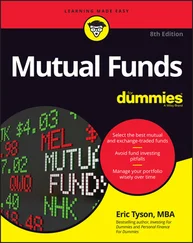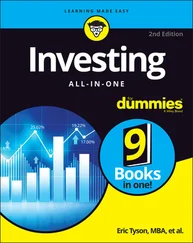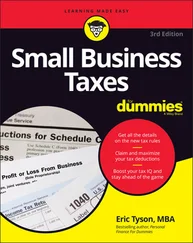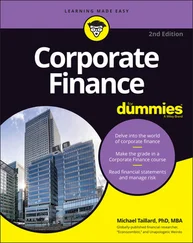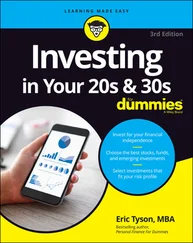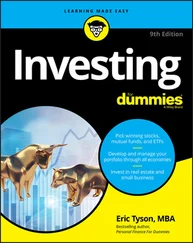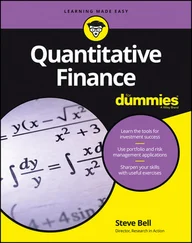 Crunching and tweaking the numbers
Crunching and tweaking the numbers
 Preparing for the nonfinancial side of retirement
Preparing for the nonfinancial side of retirement
Many folks dream about retiring. No more racing to catch the commuter train or beat the worst of rush-hour traffic. Say goodbye to long, endless meetings about topics in which you have little or no interest. Instead, you’ll have plenty of free time to do the things you can rarely find the time and energy to do while you’re working. It sure sounds appealing, doesn’t it?
Although many folks dream about retiring, few are preparing. A survey conducted by the Employee Benefit Research Institute regarding Americans’ planning for retirement found that
About 67 percent of working adults surveyed are actually saving for retirement.
Of those who are saving, 43 percent have a nest egg of less than $50,000.
About half of survey participants simply guess at the amount of their retirement needs.
We think your future plans are important enough to deserve more than a guess! But we understand that your free time is valuable to you and that you have more interesting things to do than number crunching to determine your retirement needs. So in this chapter, we promise to provide plenty of retirement planning insights and tips without spending gobs of your time. Before we dig into the financial part of planning retirement, though, we discuss some general retirement topics that are as important or even more important. You need to have a firm grasp of these items as well.
Retiring sounds so appealing when you’ve had a frustrating stretch at a job you’re not particularly enjoying. But some folks really enjoy working and aren’t eager to have wide-open daily schedules day after day, week after week. Deciding when to retire and what to do in retirement is an intensely personal decision. For sure, there are many financial and personal considerations and questions, and we begin addressing them in this chapter.
Even when you’re healthy, the job market may not be. Your employer could suffer financial hardship and reduce its workforce. Or maybe you’ll be lucky enough to retire early (even though it’s unplanned) because your employer offers you a buy-out package that’s too good to turn down. Or worse, you may lose your job with little notice and few benefits.
Ideally, when caught in one of these situations you would obtain another job and continue it until your planned retirement age. Unfortunately, events may not unfold that way. The economy, the job market, and your age can work against you. Finding another job, at a compensation level you’re willing to work for, may not be possible.
Even when you leave a full-time career voluntarily, you may plan to work part time for a few years. Or you may assume that if the first years of retirement are more expensive than planned, you can return to work at least part time. Yet a part-time job you assumed would be easy to find may not be available at all or may be available at a much lower level of pay than you expected.
WHAT FOCUS GROUPS SAY ABOUT PLANNING FOR RETIREMENT
The Society of Actuaries conducted some interesting focus groups with folks early in their retirement years. They honed in on people who had investment portfolios of at least $100,000 and who needed that money along with their Social Security and pension benefits to meet their retirement expenses.
Most of these people didn’t consult advisors and plan all that much for their retirement. Instead, they were more concerned with quitting work by a particular age. A number of focus group participants commented that their retirement decision came down to a “feeling” that they could swing it. Consider these comments from three different retirees:
“I thought you were supposed to retire when you are about 65, and thought I would try it.”
“I never sat down and thought, ‘I am 59, and in 30 years I’ll be 89. Have I allocated enough for 30 years?’ I never did that. Theoretically, I should have.”
“We take it day by day. I can’t worry about what is going to happen tomorrow.”
The focus groups also found that retirees were spending more than they expected on entertainment and travel, prescription drugs, and gas. It also wasn’t unusual for retirees to overlook inflation. And finally, although retirees were concerned about the potential for high medical and long-term care expenses, they did little planning around those expected expenses.
The lesson to be learned from all this is that you must have realistic expectations and proper assumptions when planning for your retirement. For more about managing your expenses in retirement, see Chapter 6.
Knowing How Much You Really Need for Retirement
Most people have a long-term financial goal of retiring someday. For some, doing so means leaving paid work behind entirely. To others, simply cutting back on work or doing something completely different on a part-time basis is most appealing.
If you don’t plan to work well into your golden years, you need a reasonable amount of savings/investments, which includes monthly Social Security benefits, in order to maintain a particular lifestyle in the absence of your normal employment income. (If you do plan on working some during retirement, check out Chapter 18for some helpful hints.) The following sections help you get started on determining how much money you need and coming to grips with those numbers.
Figuring out what portion of income you need
If you’re like most people, you need less money to live on in retirement than during your working years. That’s because in retirement most people don’t need to save any of their income and many of their work-related expenses (commuting, work clothes, and such) go away or greatly decrease. With less income, most retirees find they pay less in taxes, too.
 On the flip side, some categories of expenses may go up in retirement. With more free time on your hands, you may spend more on entertainment, restaurants, and travel. The costs for prescription drugs and other medical expenses also can begin to add up.
On the flip side, some categories of expenses may go up in retirement. With more free time on your hands, you may spend more on entertainment, restaurants, and travel. The costs for prescription drugs and other medical expenses also can begin to add up.
So what portion of your income do you really need as you make your retirement plan? The answer isn’t simple. Everyone’s situation is unique, so examine your current expenditures and consider how they may change in the years ahead. (Check out Chapter 6for more information on budgeting and managing your expenses in retirement.)
To help figure out how much money you need, keep the following statistics in mind. Studies have shown that retirees typically spend 65 to 80 percent of their pre-retirement income during their retirement years. Folks at the lower end of this range typically
Save a large portion of their annual earnings during their working years
Don’t have a mortgage or any other debt in retirement
Are higher-income earners who don’t anticipate leading a lifestyle in retirement that’s reflective of their current high income
Those who spend at the higher end of the range tend to have the following characteristics:
Save little or none of their annual earnings before retirement
Still have a significant mortgage or growing rent to pay in retirement
Need nearly all current income to meet their current lifestyle
Have expensive hobbies that they have more time to pursue
Читать дальше
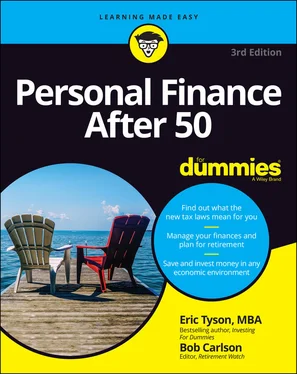
 Crunching and tweaking the numbers
Crunching and tweaking the numbers On the flip side, some categories of expenses may go up in retirement. With more free time on your hands, you may spend more on entertainment, restaurants, and travel. The costs for prescription drugs and other medical expenses also can begin to add up.
On the flip side, some categories of expenses may go up in retirement. With more free time on your hands, you may spend more on entertainment, restaurants, and travel. The costs for prescription drugs and other medical expenses also can begin to add up.